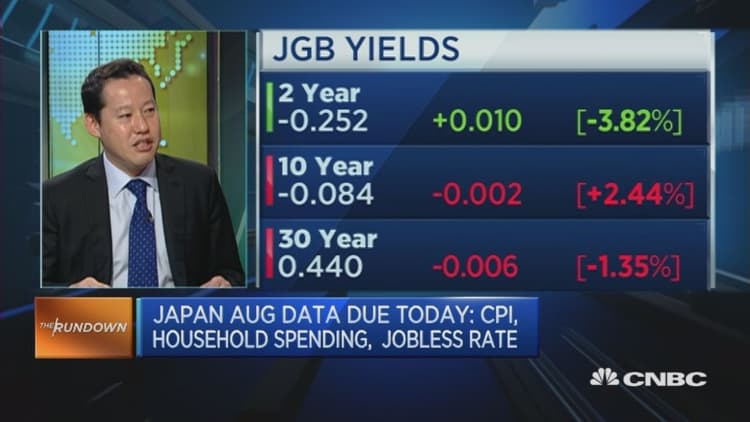Japan's core consumer prices fell in the year to August, a sixth straight drop, keeping the Bank of Japan under pressure to ease monetary conditions further as it reboots policy in a bid to hit 2 percent inflation more quickly.
Household spending fell for a sixth straight month, highlighting the weakness in private consumption, which accounts for roughly 60 percent of the economy, while a rebound in factory output brightened the outlook somewhat.
The mixed data offered little respite for the central bank, which last week switched to targeting short- and long-term interest rates from of its previous strategy of increasing base money at an annual pace of 80 trillion yen ($789 billion).
It also underscored the need for Prime Minister Shinzo Abe's government to take up the slack by implementing vigorous economic growth plans and structural reforms on top of a 28-trillion yen stimulus package it is set to roll out later this year.
The 0.5 percent year-on-year decline in the core consumer price index, which includes oil products but excludes volatile fresh food prices, was deeper than a 0.4 percent fall expected by economists. It matched the prior month's decline, which was the biggest since March 2013, when the central bank embarked on massive monetary stimulus.
The so-called core-core inflation index, which excludes food and energy prices and is similar to the core index used in the United States, rose 0.2 percent in the year to August, slowest since September 2013.

Despite three and a half years of heavy money printing by the BOJ, weak household spending and a strong yen pushing down import costs have kept inflation well away from the central bank's 2 percent goal.
Household spending fell 4.6 percent in August from a year earlier, bigger than a 2.5 percent drop expected by economists. It was the biggest decline since March, separate data from the internal ministry showed.
Separate data from the trade ministry showed factory output rose 1.5 percent in August, much bigger than a 0.5 percent rise expected by economists, led by electronics industry.
Manufacturers surveyed by the ministry expect output to rise 2.2 percent in September and increase 1.2 percent in October.
The economy grew at an annualized rate of 0.7 percent in April-June, slowing sharply from the prior quarter's growth which was led by leap year effects, as exports and capital spending fell. Analysts expect growth to remain moderate for the rest of the year.

